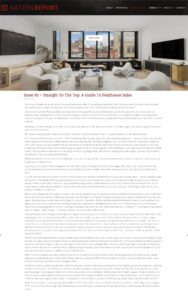Now may very well be the time that the real estate market has capitulated to a level of offering “wholesale” prices for luxury products. To emerge victorious, a savvy buyer will need to approach this market strategically. Being mindful may mean going against the grain, and anyone asking themselves, “Now or later?” should explore all facets of the market to make a truly informed decision. Let’s look at all the variables that could play out and are impacting real estate today and possibly well into this summer, which could become one of the most advantageous timings to dive in.
I believe the main elements that will influence the real estate market in the coming months are the upcoming national election, continued inflation, and rates. Additionally, let’s not forget the backdrop of the stock market. If it continues to rally, brighter skies are ahead!
There’s a lot to keep track of. Rates are going to be watched like a hawk—the 10-year treasury yield was up 7.8% at the end of April—and a June reduction based on the Fed’s declaration is anticipated. This would make for much momentum this summer. Conversely, if this doesn’t happen, we will most likely see movement delayed.
Inflation has essentially slowed everything: food, the cost of dining out, flights, rent, gas, and, of course, housing purchases. This has immobilized much of the country’s fluidity of living.
Not to mention, there is the backdrop of a potential war that is impacting to New York City, given it houses the largest Jewish population outside of Israel. Although global unrest can make people hesitant about jumping into the sales market, the reality is we are seeing the market rally regardless of this conflict. According to a recent CNBC segment, it appears war is not necessarily bad for the economy: “Historically, geopolitical shocks cause short-term volatility, not long-term market declines,” said Emily Bowersock Hill, CEO of Bowersock Capital Partners.
All this strife is further compounded by staggering statistics highlighting havoc related to our youth. According to a study by Statista, nearly 20% of young men (ages 25 to 34) who are living at home, based on the cost of living, can no longer afford their rent. CBS reiterates this, citing a recent Harris Poll that showed “roughly 45% of people ages 18 to 29 are living at home with their families—the highest figure since the 1940s.” Over 60% of Gen-Zer’s and millennials reported moving back home in the past two years.
Additionally, it’s reported (read: Sibling Society by Robert Bly) via a study completed by Pew Research that young men are not having intimate relationships, which is impacting their self-esteem and their ability to feel agency in their lives. Many do not think they are functioning as productive members of society. Psychology Today reports this study indicates that over 60% of young men are currently single, and sexual intimacy is at a 30-year low across genders.
These factors relate to real estate because they may be the catalyst for parents buying property for their children to troubleshoot the issues. To reiterate: According to NBC News, we are seeing a spike in parents buying for their children. Likewise, according to a National Association of Realtors report at the end of 2023, almost 25% of homebuyers ages 22 to 30 reported that cash gifts from family and friends were a source of their down payments. Now, consider others who were gifted properties purchased outright in all-cash deals, and the percentage is even higher!
This is a long-winded way of saying that inflation has a huge impact on the socio-economic and social aspects of our culture. It is a very big deal.
Another factor to look at is inventory, which is still tight. Obviously, nobody wants to give up a 2.5% interest rate to take advantage of 6.8%-plus right now, but those rates will change. You can always refinance your rate but can’t refinance your purchase price. Buying real estate right now would essentially be buying wholesale. While the entry market is still very tight, the luxury market is moving, and people are taking full advantage of that “wholesale” opportunity. What is asking $18 million is trading at $15 million.
The real indicator of optimism is movement in the co-op market, which tells me that people are feeling somewhat copacetic again regarding their liquidity. Co-ops tend to have a much more stringent vetting process, which requires a specific post-closing liquidity to be reflected and their debt-to-income (DTI) ratio to be below a certain threshold.
Buyers tend to be strategic about where they are pulling these additional funds from to subsidize post-closing liquidity requirements. This is especially true for most parents who are pulling funds to help their young working children or young married couples get their first leg into ownership. They can apply the interest from past investments toward a down payment in a co-op if there is a nice surplus. In this scenario, we are seeing an uptick, which means people are seeing the inherent value in pricing for quality locations that hold weight based on school migration and acceptance; also, they can now make the numbers work.
And then, of course, the big cherry on top is that an election year infuses even more volatility. Risk-averse people tend to wait to see how the election will play out before jumping into the real estate market. So, some may stay static during the summer but will be poised to jump at the end of autumn after we know the results.
As the year progresses, many of our big questions will be answered, and the real estate market may display more stability. It’s impossible to know for sure how it will all shake out, but I believe this summer will be a good time for the savvy and intrepid to take advantage of the opportunity to get more for their money.

